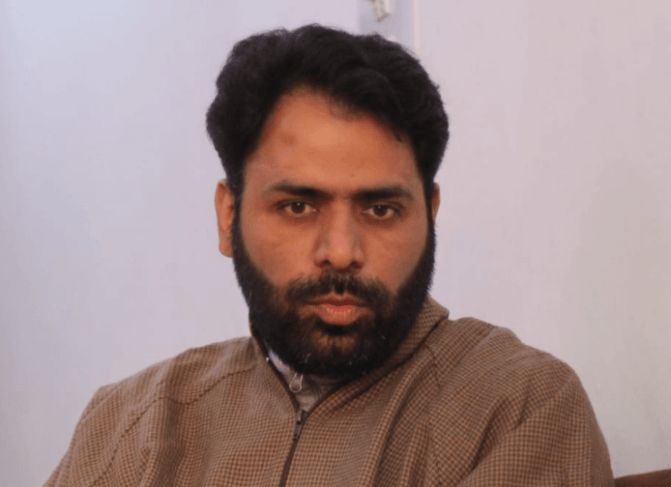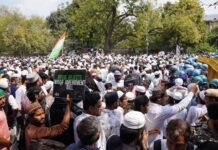The Indian National Investigative Agency (NIA) arrested the prominent Kashmiri human rights activist, Khurram Parvez, after raiding his office and home in Srinagar on Monday.
Parvez, 44, has been booked under the controversial and repeatedly misused Unlawful Activities Prevention Act (UAPA) and multiple other charges.
The sections invoked against Parvez include 120B, 121 and 121A of Indian Penal Code (IPC) and sections 17, 18, 18B, 38 and 40 of Unlawful Activities Prevention Act (UAPA) Act, 1967, according to the arrest memo. A copy of which is in the possession of 5Pillars.
The NIA has not issued a statement about the raids and subsequent arrest. However, the family has been informed that Parvez has been arrested and will be flown to Delhi.
According to the IPC 120B is a punishment for criminal conspiracy. 121 is waging, or attempting to wage war, or abetting waging of war, against the Government of India, while 121A is conspiracy to commit offences punishable by section 121.
Similarly, section 17 of the UAPA is a punishment for raising funds for terrorist acts. Section 18 is a punishment for conspiracy, while 18B is punishment for recruiting any person or persons for terrorism. Section 38 of the UAPA is an offence relating to membership of a terrorist organisation, while section 40 is an offence of raising funds for a terrorist organisation.
Raids and arrest
Subscribe to our newsletter and stay updated on the latest news and updates from around the Muslim world!
Parvez’s home was raided at 7:30am and it lasted for almost six hours. According to family sources, the NIA seized his mobile phone, laptop and some books.
His work office situated near Amira Kadal bridge was raided for over 12 hours, and several electronic devices and documents were seized during the search.
Parvez is a program coordinator of the Jammu and Kashmir Coalition of Civil Societies (JKCCS), an amalgamation of various non-funded, non-profit, campaign, research and advocacy organisations, based in Srinagar. He is also the chairperson of the Asian Federation Against Involuntary Disappearances (AFAD).
Reaction and outrage
The arrest has elicited reactions from global human rights defenders and organisations, including the United Nations (UN).
Mary Lawlor, U.N. Special Rapporteur on Human Rights tweeted: “I’m hearing disturbing reports that Khurram Parvez was arrested today in Kashmir & is at risk of being charged by authorities in #India with terrorism-related crimes… He’s not a terrorist, he’s a Human Rights Defender.”
The Rafto Foundation, a body working for the global promotion of human rights appealed to the Indian government to “immediately release Mr. Parvez.”
Jostein Hole Kobbeltvedt, Director of the Rafto Foundation said: “We observe with regret that the Indian government intimidates citizens working to secure the values and norms enshrined both in the Constitution of India and in international treaties ratified by the government itself. We appeal to Indian authorities to respect Mr. Parvez’s habeas corpus rights and release him from detention without delay.
“The work of Parvez and JKCCS to document human rights violations in Kashmir under very difficult circumstances has received high praise from international legal experts. JKCCS and Khurram Parvez have consistently espoused non-violence and acted impeccably as human rights defenders to earn the highest reputation both within Kashmir and from international institutions,” the statement read.
Based in Geneva, the World Organisation Against Torture said: “We are deeply concerned about the high risk of torture while in custody. We call for his immediate release.”
David Kaye, a former UN Special Rapporteur for freedom of expression, tweeted: “If, as reported, Khurram Parvez has been arrested by India’s ‘counter-terrorism’ NIA, it’s yet another extraordinary abuse in Kashmir.”
Previous detention and harassment
Parvez was previously booked under the draconian Public Safety Act (PSA) in 2016, a day after he was barred from travelling to participate in a UN Human Rights Council session in Switzerland. He was subsequently released from prison after 76 days.
In October 2020, the NIA conducted raids at multiple locations across Kashmir including Parvez’s home and office.
JKCCS has published several reports on human rights violations including torture, extra-judicial killings, unmarked graves and enforced disappearances by Indian forces.
The reports by JKCCS played a pivotal role in the first-ever report published in 2018 by the UNHRC, which calls for an international inquiry into multiple human rights violations in Kashmir.
Parvez lost his leg in 2004 in a blast triggered by a high-intensity improvised explosive device while travelling in the frontier region of Kupwara.






















